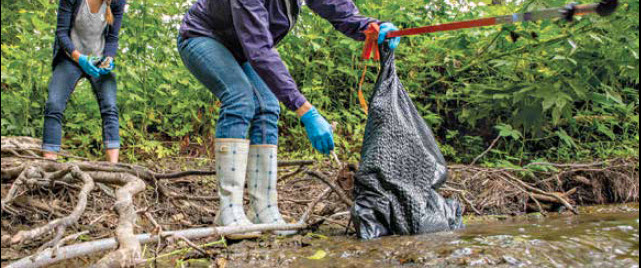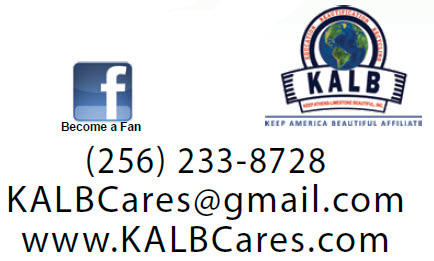Litter Says A Lot About A Community…We Want Our Community To Say A Lot About Litter!
 By: Lynne Hart
By: Lynne Hart
Part 2
In Part 1 of this series, I shared information on the pressure points that lead to behavioral changes in people who litter.
In this article, I am focusing on what each of us can do to help prevent litter. Even those of us who say we aren’t litterbugs may inadvertently contribute to the litter problem due to habits we may not think about. It is my hope that we can each take a good look at this list and be honest about habits that we may need to change.

- Set an example for others. Our children, neighbors, coworkers, and others are watching us. Follow the rest of these points to set the example.
- Always bag your trash before putting it into your trash can. When city trucks pick up cans with loose trash, the wind catches light items and litter is created. In the county, every time a trash collector handles a can full of loose trash, some of it will escape the truck and again litter is created. So even those who say they would never litter do if loose garbage is in their trash can.
- Keep securely fitting lids on trash cans to prevent wildlife from getting into garbage cans. When cans are knocked over or bags are torn open, trash becomes the neighbors’ problem, too.
- Keep trash out of your truck bed. Never toss empty bottles and cans or other loose items into the bed of a pickup truck. The wind will catch it and whip it out onto the road. I have followed many trucks and watched it happen.
- Cover your load. If you are transporting a load of anything, cover it. It’s the law.
- Always carry a litter bag in your vehicle to collect trash so you can easily dispose of it at home.
- Never toss cigarette butts. They are small but mighty! Filters are made of plastic and take years to decompose and are filled with poisons and chemicals that leach into our groundwater. With trillions being littered every year, they are an environmental nightmare.
- Keep top and side doors on dumpsters closed, if your business has one. This will keep the wind from blowing items out. If you see an open dumpster, mention it to the store manager.
- Empty Styrofoam out of boxes before recycling. Be sure that Styrofoam peanuts are bagged and tied. Styrofoam is very light and will blow out of dumpsters, bins, and trash cans very easily.
- Suggest an increase in trash containers at sporting venues and other outdoor locations when needed. Don’t just grumble, speak with the people who have the authority to make a change.
- REPORT what you see! Call 256-233-8000 to report witnessed litter incidents or illegal dump sites. See more info below.
Speak up and speak out! Don’t be afraid to make litter a topic of conversation and remind friends and family of the consequences of littering. Even though we may not see it, litter thrown on the ground eventually becomes the problem of another human or animal.

Some people truly don’t care about the environment. In that case, let law enforcement do the talking. If you see an act of littering or illegal dumping, get the tag number and description of the vehicle and call KALB at 256-233-8000 to report the incident. KALB and law enforcement will keep your information confidential. If illegal dumping is in progress, call the authorities first in hopes the person(s) dumping can be caught in the act.
Remind others that it is their tax dollars that pay for cleaning up litter. City and county litter crews are not without cost. Even when inmates are used, there is the cost of supervision, vehicles, supplies, and more. There is so much litter out there, the litter crews just can’t keep up. Litter cleanup in the U.S. costs over $11 billion and taxpayers and business owners foot the bill.
Of course, we are not suggesting that anyone confront strangers about littering. That could be unsafe.
Please consider being a part of the Elk River Cleanup and County-Wide Trash Attack taking place on March 9. Call, email, or visit our Facebook page for information.
By: Lynne Hart – Executive Coordinator – Keep Athens-Limestone Beautiful